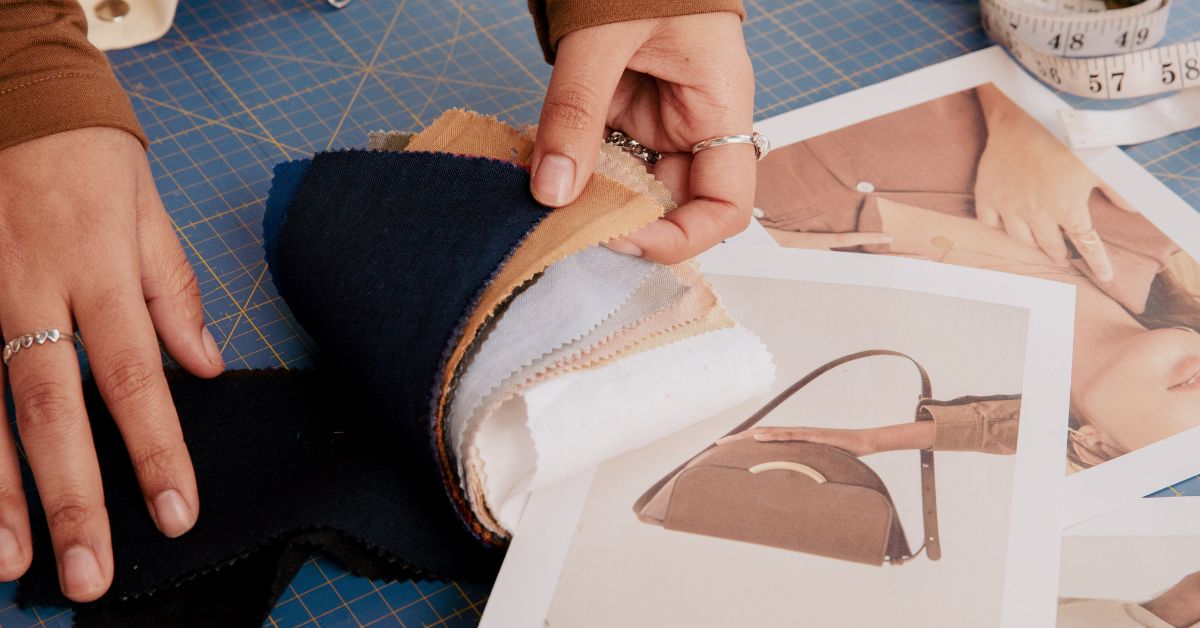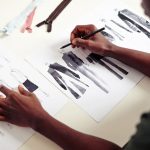The benefits of fashion designing are vast. Fashion designing not only allows individuals to show their creativity but also affects mental health positively. One of the advantages of fashion designing is its power to enhance self-esteem and confidence. Designers usually find relaxation and happiness in creating eye-catching outfits, which helps reduce stress and encourage mental health.
In this article, we will learn about fashion designing benefits, themes that inspire designers, and how fashion designers contribute to mental health advocacy. We’ll also understand how fashion impacts self-confidence and emotional stability.
Table of Contents:
- Understanding the Therapeutic Benefits of Fashion
- The Role of Fashion Designers in Mental Health Advocacy
- The Impact of Fashion on Self-Confidence
- Sustainability and Mental Health
- Conclusion
Understanding the Therapeutic Benefits of Fashion
Fashion can have a therapeutic effect on mental health by helping people express themselves and deal with emotions. Designing garments is an artistic activity that enables people to fight stress and other issues. Designing can be a form of art therapy as fashion designers use this to communicate their opinions, feelings, and personal experiences. The overall well-being can be improved by creating something different that gives a sense of achievement, control, and self-expression.
By simply selecting clothes that reflect how an individual feels or wants to feel, people use fashion to deal with emotions. For instance, wearing bright color clothing can light up someone’s mood, on the other hand creating or styling clothes can be a calming and creative outlet. This process is called enclothed cognition which indicates how wearing or creating certain types of clothing can influence emotions, build self-confidence, and support people to manage stress and anxiety. With the help of fashion, people can explore their true selves or identity and emotions in a manner that words can’t fully explain.
The Role of Fashion Designers in Mental Health Advocacy
Let’s explore some roles of fashion designers in mental health advocacy:
- Promoting Mental Health Awareness Through Designs: Fashion designers utilize their creative platforms to promote awareness about mental health challenges. Emotions, mental health issues, and personal struggles related collections are usually created by fashion designers which start conversations about emphasizing the importance of mental well-being.
- Initiatives to Reduce Stigma: To break the stigma around mental health many designers take part in related initiatives. By partnering with mental health organizations, setting up fashion shows for mental well-being, and talking openly about their own experiences, they contribute towards normalizing mental health discussions.
- Encouraging Conversations About Mental Health: By incorporating mental health messages in their work, fashion designers encourage open conversations about mental well-being. This can be through workshops, campaigns, or partnerships that influence people to speak openly about their mental health.
- Creating Fashion as a Form of Therapy: Some designers encourage the thought of fashion as a therapeutic tool. By advising others to use fashion as a creative outlet, they help people express feelings, de-stress, and find comfort through the process of designing and creating clothes.
The Impact of Fashion on Self-Confidence
The impact of fashion on self-confidence is huge and has brought many people to realize various things about themselves and has enabled them to express their feelings and emotions with their outfits:
How Wearing Well-Fitting and Expressive Clothes Boosts Confidence
Your confidence gets boosted when you wear clothes that fit well and match your style. When you wear something that makes you feel good and comfortable and goes with your personality, it improves how you see yourself. For example, your sense of control and empowerment is enhanced when selecting outfits that show your taste and mood. When you feel comfortable in your clothes, your body language and entire attitude reflect your confidence, irrespective of whether you are wearing something formal or are in your casual look.
Empowerment Stories Through Fashion
Through fashion, several people have found emotional empowerment. For example, people who have struggled with self-esteem issues have spoken about how wearing an outfit that they love has really helped them overcome insecurities. Some may turn to bright colors, eye-catching designs, or trendy styles to express themselves more openly, improving their emotional well-being. Fashion enables them to express their true selves, and this self-expression allows them to be more in control of their emotions and feel powerful. From daily clothes to special occasion outfits, the right fashion decisions can make people feel confident, strong, and ready to face the world.
Sustainability and Mental Health
Exploring the profound connection between sustainable practices and mental well-being reveals how conscious choices can enhance both our environment and our psychological health.
Psychological Benefits of Embracing Sustainable Fashion
- Feeling Good About Choices: People often feel proud of their decisions after selecting sustainable fashion over other fashion styles. Knowing that they are helping the environment by choosing clothes made from eco-friendly materials or from brands that are known for ethical practices can lead to a sense of accomplishment. This feeling of making a positive impact can enhance their mood and improve their self-esteem.
- Connection to Nature: Eco-friendly fashion often focuses on natural materials and processes. A deeper connection with nature can be formed by wearing clothes made from hemp, organic cotton, or recycled fabrics. This connection can provide people a sense of tranquillity and peace as they enjoy the beauty of the environment and recognize their parts in its protection.
- Mindfulness and Intentionality: Holding on to sustainable fashion promotes mindful shopping. Rather than buying many fast-fashion products, people learn to think about what they really need and how their decisions harm the environment. This conscious approach can relieve stress and anxiety by giving people more control over their consumption habits.
- Creative Expression: Many eco-friendly brands focus on distinctive, handcrafted, or limited-edition pieces. This variety allows people to express their personality and creativity more efficiently. When people find clothing that reflects their identity, it can increase their confidence and happiness.
Contributing to Environmental Consciousness Improves Mental Well-Being
A sense of purpose arises when people engage in sustainable fashion. By involving themselves in encouraging environmental awareness and conversation, they feel connected to a larger community. This sense of belonging can create a feeling of shared responsibility and boost mental health. Additionally, being a part of sustainable practices reduces anxiety related to climate change, as individuals feel empowered by their good contribution, whether it is minimizing waste or supporting eco-friendly brands.
Supporting sustainable fashion helps local craftspeople and small companies, which benefits communities as a whole. This involvement promotes a sense of belonging and enhances general well-being. Furthermore, by purchasing sustainable clothing, people can lessen the guilt associated with fast fashion, resulting in increased happiness and life satisfaction.
All in all, embracing sustainable fashion offers many psychological benefits. It promotes a sense of pride in making environmentally friendly choices, fosters mindfulness, enhances creative expression, and strengthens community ties. By contributing to environmental consciousness, individuals can improve their mental well-being, reduce anxiety, and find a greater sense of purpose and connection in their lives.
Conclusion
In conclusion, fashion design has many benefits for mental health, including boosting self-esteem and promoting creative expression. The benefits of fashion designing extend beyond just making clothes; they help individuals connect with their emotions and share their stories. Fashion designer thoughts often reflect personal experiences and struggles, making their work meaningful and relatable. Additionally, fashion design inspiration themes, such as nature or personal journeys, allow designers to create pieces that resonate with many people.
By embracing fashion and its positive impacts, we can enhance our well-being and build a community that values creativity and self-expression. If you’re interested in exploring these benefits further, consider enrolling in AAFT Online’s Diploma in Fashion Design to nurture your passion and creativity in the fashion industry. Start your journey today!
(Visited 1,026 times, 1 visits today)
Popular Search
Top 10 DJ India
Makeup Steps
Advantages of Makeup
Interior Designer Salary
Makeup Artist Course
Benefits Of Photography
Hospital Waste Management
Types of Fashion Designing
Types of Lenses in Photography
How to Become a Radio Jockey
Best Nutrition Courses in India
Importance of Media Management
How To Become a Dietitian in India
Importance of Nutrition in Health
Interior Design History and Origins
Top 10 Famous Interior Designers
Top 10 Music Labels in India
Top 10 Best Animation Studios in India
Top 10 Nutraceutical Companies in India
Top 10 Fashion Designers in the World
How To Write a TV Commercial Script
Top 10 Career Opportunities in Fashion Designing
Advantages and Disadvantages of Animation
























